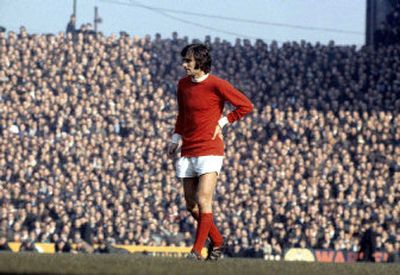Soccer great Best dies

George Best, the Irish soccer prodigy whose brilliance on the field and rock-star lifestyle made him an international celebrity in the 1960s and ‘70s, died Friday at Cromwell Hospital in London. He was 59.
The former Manchester United winger had been in failing health for several weeks and had multiple organ failure coupled with a lung infection and internal bleeding.
“Everyone has their own opinion about football and their favorite players,” Manchester United manager Alex Ferguson said. “But in terms of British players, you would find it difficult to think of anyone better.”
British Prime Minister Tony Blair said Best was “the most naturally gifted footballer of his generation.”
Best had battled alcoholism for decades and was diagnosed with severe liver damage in 2000. He received a liver transplant in 2002 but later resumed drinking. In 2004, he was banned from driving for 20 months after pleading guilty to drunken driving.
Even with his alcoholism and other woes – he was briefly jailed for assault and encountered gambling and tax problems – Best retained his popularity with fans as well as his standing as one of the greatest players in the history of the game.
Emerging from the back streets of Belfast in the early 1960s, Best rocketed to fame in the red jersey of Manchester United, ranking alongside Pele of Brazil, Diego Maradona of Argentina, Johan Cruyff of the Netherlands and Franz Beckenbauer of Germany as one of soccer’s five unquestioned masters since World War II.
Dubbed “the fifth Beatle” by the media because of his fame and his mop-top haircut, he was the first soccer star to transcend the sport. Long before there was David Beckham, there was Best – tabloid headlines, squealing female fans and all.
“I spent a lot of money on booze, birds and fast cars,” he once said. “The rest I just squandered.”
Equally notorious was this Best comment: “I used to go missing a lot. Miss Canada, Miss United Kingdom, Miss World. … “
With the 5-foot-5 Best in the lineup, Manchester United won the English championship in 1965 and 1967. But it was in 1968 that he achieved his greatest fame. He led United to the European Cup, his overtime goal against Benfica in the final at London’s Wembley Stadium sparking a 4-1 victory.
It was the first time an English team had won European soccer’s most coveted prize. Best was named England’s Footballer of the Year and European Player of the Year.
Best was born May 22, 1946, in Belfast, seemingly destined for an athletic career. His father had been an amateur soccer player of some note, and his mother had excelled at field hockey.
By his teens, his gifts as a player had become evident. He was spotted by Bob Bishop, Manchester United’s chief scout in Ireland, who, according to legend, sent a telegram to United coach Matt Busby that read: “I believe I’ve found you a genius.”
Signed as an amateur, he turned professional on his 17th birthday and made his debut three months later.
He played with vision and imagination, his swerving runs leaving defenders bewildered and beaten. Best scored 178 goals in 466 games for United during his 10 years with England’s most illustrious club.
Best parted company with Manchester United in 1974, when he was only 27, the club having grown tired of his constant absences and heavy drinking.
Best briefly revived his career in the now-defunct North American Soccer League, coming first to Los Angeles to play for the Aztecs in 1976 and later for the Fort Lauderdale Strikers and the San Jose Earthquakes.